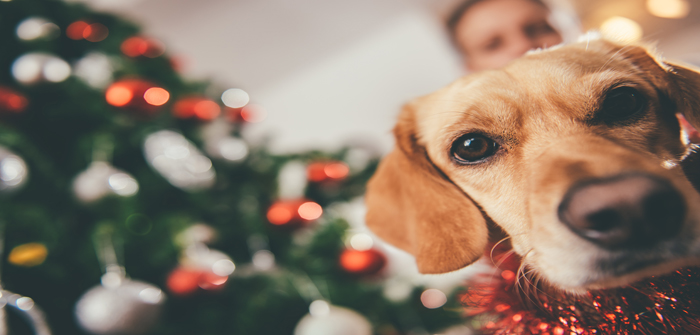New research, from Burns Nutrition, reveals the lengths dog owners will go to spoil their four-legged friends.
One in six respondents admitted to giving their dogs a full Christmas dinner with all the trimmings while 10% confessed to feeding their dogs at the Christmas table.
Dogs in the East Midlands are likely to be the most spoilt with 77% of residents confessing to buying their canine friends Christmas gifts. However, dogs in Northern island might not be so lucky as only 45% of residents are planning on doing so.
The research also highlights the bad habits dog owners are guilty of over Christmas including overfeeding and rewarding dogs with unsuitable food items like meat bones and chocolate.
Despite being toxic and potentially fatal to dogs, one in 20 owners admit to feeding their dogs chocolate over the Christmas period. Large amounts of chocolate can cause muscle tremors, seizures, internal bleeding and heart attacks in dogs.
And it’s not just chocolate that could see pet owners dashing to the vets this Christmas; meat bones from the Christmas roast have the potential to cause serious harm to dogs’ mouths and are considered a choking hazard. Yet a third of pet owners surveyed admitted to giving their dogs meat bones at Christmas.
Of those surveyed, 10% also admitted to feeding dogs titbits when they’re already overweight, an issue John Burns, veterinary surgeon and founder of Burns Pet Nutrition, is keen to highlight as part of his aim to reduce pet obesity.
He said: “We overindulge in everything at Christmas particularly when it comes to eating and drinking, and sadly we extend this excess to our pets and their digestive systems are simply not designed to cope with the increased levels of food.
“We treat our dogs because we love them, but by rewarding them with unsuitable items like meat, cheese, beef and chocolate, we could be causing them serious harm and irreversible damage. That’s not to say you can’t treat dogs at Christmas, it’s just important to be mindful of the volume of food they will be consuming in a day.”
He added: “It could be worth reducing their meal sizes to cater for the additional treats they might get throughout the Christmas period and ensure they are only given lean, bone free meat and unsalted vegetables.
“Going for dog walk can also fall down the list of priorities on Christmas Day, especially if you’re in charge of cooking and organising, but it’s really important that they are given time to stretch their legs and get outside, particularly if they will be eating more than they would on a normal day. It’s a good excuse to get everyone out of the house and recharge after a big lunch.”


